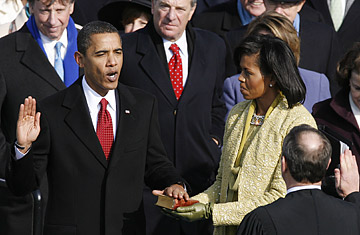
The 44th President of the United States, Barack Obama, takes the oath given by U.S. Supreme Chief Justice John Roberts, Jr. during the inauguration ceremony in Washington, January 20, 2009.
(2 of 6)
But the tone of the speech was not defiant or angry, or celebratory, for that matter. It was resolute, suffused with sobriety, reflecting a tough-minded realism at home and abroad. Obama made clear that his domestic liberalism would be enacted conservatively. Where government programs can help, he said, "we intend to move forward." If they are useless or outdated, "programs will end. And those of us who manage the public's dollars will be held to account--to spend wisely, reform bad habits and do our business in the light of day." Overseas, he warned, "those who seek to advance their aims by inducing terror and slaughtering innocents ... You cannot outlast us, and we will defeat you."
Note the simplicity of the words. This is a different Obama from the one who, full of himself last winter, filled his speeches with gaseous oratory like "We are the ones we've been waiting for." The personal transformation has been gradual, subtle--and the words have grown simpler as the economy collapsed and the full weight of office began to press in on him. The preternatural calm that seemed an attractive part of his personality during the primaries became his dominant trait in the general election--and the defining principle of his transition. He seems, in the modesty of his rhetoric, to have embarked on a rather bold experiment. "This is going to be a general principle of governing," he told CNN's John King. "No spin, play it straight, describe to the American people the state that we're in."
And that was the oddest aspect of Obama's transition, the lack of pomp and bombast to it. He rarely used the word I; he addressed the nation as a community of mature adults. He was all modesty; he asked for better ideas for his monumental stimulus plan (and quickly acceded to Democratic demands that he remove some of the tax breaks for small businesses). He seemed, at every turn, to predict that he would make mistakes; he did so once more at the congressional lunch immediately after he was sworn in. The cumulative effort of this behavior has been to convey a sense of seriousness--not just in his personal aspect but also in the work of his team. In gestation, this was an Administration marked by attention to detail and a deep appreciation of the intricacies of governance.
In the midst of the transition, President Obama was faced with a telling policy choice: whether to declare a temporary sales-tax holiday. His economic advisers loved the idea. It would provide immediate consumer stimulus, a direct jolt that might unclog the commercial arteries. The money could easily be passed from the Federal Government to the states, which administer sales taxes. But Obama resisted and, finally, rejected the idea. "He thought it would provide a temporary benefit, that it had no substantial or lasting policy impact," a senior transition adviser told me. "I think he was remembering the campaign, when Hillary and McCain favored the gas-tax holiday, which he thought was frivolous, and he opposed it for that very reason--if we're going to spend money, let's spend it on investments that will make us stronger in the future."
